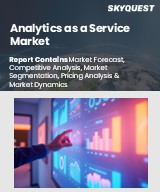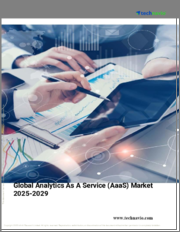
|
시장보고서
상품코드
1701869
AaaS(Analytics as a Service) 시장 보고서 : 유형별, 컴포넌트별, 전개 유형별, 기업 규모별, 업계별, 지역별(2025-2033년)Analytics as a Service Market Report by Type, Component, Deployment Type, Enterprise Size, Industry Vertical, and Region 2025-2033 |
||||||
AaaS(Analytics as a Service) 세계 시장 규모는 2024년 282억 달러에 달할 것으로 예측됩니다. 향후 IMARC Group은 이 시장이 2033년까지 1,438억 달러에 달하고, 2025-2033년 19.9%의 연평균 성장률(CAGR)을 보일 것으로 전망하고 있습니다. 이 시장은 시스템 운영을 더 잘 이해하여 서비스를 업데이트하려는 새로운 조직의 요구, 소셜 미디어 용도의 광범위한 채택, 여러 산업 분야에서 급속한 자동화, 제조 시설의 예측 및 과거 데이터 분석 활용 증가에 의해 주도되고 있습니다.
AaaS(Analytics as a Service)는 클라우드를 통해 맞춤형 구독 기반 데이터 분석 소프트웨어와 절차를 제공하는 비즈니스 솔루션으로, 주로 다양한 데이터와 정보를 중앙 집중식 플랫폼에 통합하여 수작업을 줄이고 업무 효율성을 높입니다. AaaS는 유형에 따라 예측형, 처방형, 진단형, 서술형 분석으로 분류되며, 다른 데이터 분석 도구와 비교했을 때, AaaS는 다른 데이터 분석 도구와 비교했을 때, 데이터 분석 도구에 비해 훨씬 더 많은 이점이 있습니다. 다른 데이터 분석 도구와 비교하여 AaaS는 고객에게 셀프 서비스 또는 타사 관리 머신러닝(ML) 도구를 통해 데이터를 분석하기 위해 원격 분석 도구에 대한 액세스를 제공합니다. 또한, 이 플랫폼은 소비자 행동 및 트렌드 분석, 데이터 수집, 중앙에서 관리되는 데이터 그룹에 대한 개인화된 액세스 제공, 고도의 대화형 서비스 제공을 지원합니다. 그 결과, 통신 및 IT, 소매, 정부, 헬스케어, 은행, 금융 서비스 및 보험(BFSI) 업계에서 널리 채택되고 있습니다.
AaaS(Analytics as a Service) 시장 동향 :
세계 AaaS 시장의 성장을 가속하는 주요 요인 중 하나는 시스템 운영과 고객 행동을 더 잘 이해하여 서비스를 업데이트하려는 새로운 조직의 요구입니다. 이에 따라 중소기업들은 저렴한 비용으로 데이터 기반 의사결정을 내리기 위해 이 기술을 널리 채택하고 있으며, 이는 시장 성장을 뒷받침하고 있습니다. AaaS에 대한 수요는 소셜 미디어 용도의 확산으로 인해 플랫폼 전반에 걸쳐 정형 및 비정형 데이터의 양이 증가하고 있습니다. 비정형 데이터의 양이 증가하고 있습니다. 또한, 예상치 못한 다운타임을 피하기 위해 제조 시설에서 예측 및 이력 데이터 분석의 사용이 증가하고, 일부 산업에서 급속한 자동화가 진행되면서 또 다른 성장 촉진요인으로 작용하고 있습니다. 이와는 별도로 사물인터넷(IoT)의 도입과 스마트폰의 보급으로 브랜드는 기계가 생성한 데이터를 동시에 수집하고 저장할 수 있게 되었습니다. 그 결과, 기업은 내부 자산의 성능을 향상시키고, 운영 비용을 절감하고, 적극적인 고객 지원을 제공하고, 수익률을 향상시킬 수 있게 되었으며, 시장 전망은 밝아졌습니다.
본 보고서에서 다룬 주요 질문
- 2024년 AaaS(Analytics as a Service) 세계 시장 규모는?
- 2025-2033년 AaaS(Analytics as a Service) 시장의 예상 성장률은?
- AaaS(Analytics as a Service) 세계 시장을 촉진하는 주요 요인은?
- 코로나19가 AaaS(Analytics as a Service) 세계 시장에 미치는 영향은?
- AaaS(Analytics as a Service) 세계 시장 유형별 분류는?
- 서비스형 애널리틱스(AaaS) 세계 시장 내 구성요소별 분류는?
- AaaS(Analytics as a Service) 세계 시장 전개 유형별 분류는?
- AaaS(Analytics as a Service) 세계 시장의 산업별 분류는?
- AaaS(Analytics as a Service) 세계 시장의 주요 지역은?
- AaaS(Analytics as a Service) 세계 시장의 주요 기업은?
목차
제1장 서문
제2장 조사 범위와 조사 방법
- 조사 목적
- 이해관계자
- 데이터 소스
- 1차 정보
- 2차 정보
- 시장 추정
- 보텀업 접근
- 톱다운 접근
- 조사 방법
제3장 주요 요약
제4장 서론
- 개요
- 주요 업계 동향
제5장 세계의 AaaS(Analytics as a Service)(AaaS) 시장
- 시장 개요
- 시장 실적
- COVID-19의 영향
- 시장 예측
제6장 시장 분석 : 유형별
- Predictive
- Prescriptive
- Diagnostic
- Descriptive
제7장 시장 분석 : 컴포넌트별
- 솔루션
- 서비스
제8장 시장 분석 : 전개 유형별
- 프라이빗 클라우드
- 퍼블릭 클라우드
- 하이브리드 클라우드
제9장 시장 분석 : 기업 규모별
- 중소기업
- 대기업
제10장 시장 분석 : 업계별
- 은행, 금융서비스 및 보험(BFSI)
- 소매
- 정부 및 공공 부문
- IT 및 통신
- 헬스케어
- 제조
- 기타
제11장 시장 분석 : 지역별
- 북미
- 미국
- 캐나다
- 아시아태평양
- 중국
- 일본
- 인도
- 한국
- 호주
- 인도네시아
- 기타
- 유럽
- 독일
- 프랑스
- 영국
- 이탈리아
- 스페인
- 러시아
- 기타
- 라틴아메리카
- 브라질
- 멕시코
- 기타
- 중동 및 아프리카
- 시장 분석 : 국가별
제12장 SWOT 분석
- 개요
- 강점
- 약점
- 기회
- 위협
제13장 밸류체인 분석
제14장 Porter의 Five Forces 분석
- 개요
- 바이어의 교섭력
- 공급 기업의 교섭력
- 경쟁 정도
- 신규 진출업체의 위협
- 대체품의 위협
제15장 가격 분석
제16장 경쟁 구도
- 시장 구조
- 주요 기업
- 주요 기업 개요
- Atos
- Cloudera Inc.
- Google LLC(Alphabet Inc.)
- Hewlett Packard Enterprise Company
- Infosys Limited
- International Business Machines Corporation
- Microsoft Corporation
- Oracle Corporation
- ScienceSoft USA Corporation
- Sisense
- Teradata Corporation
- Tibco Software Inc.
The global analytics as a service (AaaS) market size reached USD 28.2 Billion in 2024. Looking forward, IMARC Group expects the market to reach USD 143.8 Billion by 2033, exhibiting a growth rate (CAGR) of 19.9% during 2025-2033. The market is propelled by emerging organizational need to update their services by better understanding system operations, the widespread adoption of social media applications, rapid automation across several industry verticals, and the increasing utilization of predictive and historic data analysis by manufacturing facilities.
Analytics as a Service (AaaS) refers to a business solution that provides customized, subscription-based data analytics software and procedures through the cloud. It primarily integrates the differently sourced data and information into a centralized-managed platform, thereby reducing manual labor and enhancing operational efficiency. Depending on the type, AaaS is classified into predictive, prescriptive, diagnostic, and descriptive analytics types. As compared to other data analytic tools, AaaS offers its clients with an access to remote analytical tools for analyzing data either via self-service or third-party managed machine learning (ML) tools. In addition to this, this platform aids in analyzing consumer behavior and trends, collecting data, providing personalized access to centrally managed data groups, and offers advanced and interactive services. Consequently, it is widely adopted in the telecommunications and IT, retail, government, healthcare, and banking, financial services, and insurance (BFSI) industries.
Analytics as a Service (AaaS) Market Trends:
One of the key factors driving the global AaaS market growth is the emerging organizational need to update their services by better understanding system operations and customer behavior. In line with this, small- and medium-sized enterprises (SMEs) are widely adopting the technology to make data-driven decisions at lower costs, which is supporting the market growth. The demand for Aaas is also facilitated by the widespread adoption of social media applications, which has resulted in an increase in the volume of structured and unstructured data across platforms. Moreover, rapid automation across several industry verticals, along with the increasing utilization of predictive and historic data analysis by manufacturing facilities to avoid unexpected downtime, are acting as other growth-inducing factors. Apart from this, the increasing incorporation of the Internet of Things (IoT) and the proliferation of smartphones has enabled brands to simultaneously gather and store machine-generated data. This, in turn, is helping organizations in enhancing the performance of their internal assets, reducing operational costs, providing proactive customer support, and increasing the profit margin, thereby creating a positive outlook for the market.
Key Market Segmentation:
Breakup by Type:
- Predictive
- Prescriptive
- Diagnostic
- Descriptive
Breakup by Component:
- Solutions
- Services
Breakup by Deployment Type:
- Private Cloud
- Public Cloud
- Hybrid Cloud
Breakup by Enterprise Size:
- Small and Medium-sized Enterprises
- Large Enterprises
Breakup by Industry Vertical:
- BFSI
- Retail
- Government and Public Sector
- IT and Telecommunication
- Healthcare
- Manufacturing
- Others
Breakup by Region:
- North America
- United States
- Canada
- Asia-Pacific
- China
- Japan
- India
- South Korea
- Australia
- Indonesia
- Others
- Europe
- Germany
- France
- United Kingdom
- Italy
- Spain
- Russia
- Others
- Latin America
- Brazil
- Mexico
- Others
- Middle East and Africa
Competitive Landscape:
The competitive landscape of the industry has also been examined along with the profiles of the key players being Atos, Cloudera Inc., Google LLC (Alphabet Inc.), Hewlett Packard Enterprise Company, Infosys Limited, International Business Machines Corporation, Microsoft Corporation, Oracle Corporation, ScienceSoft USA Corporation, Sisense, Teradata Corporation and Tibco Software Inc.
Key Questions Answered in This Report
- 1.What was the size of the global analytics as a service (AaaS) market in 2024?
- 2.What is the expected growth rate of the global analytics as a service (AaaS) market during 2025-2033?
- 3.What are the key factors driving the global analytics as a service (AaaS) market?
- 4.What has been the impact of COVID-19 on the global analytics as a service (AaaS) market?
- 5.What is the breakup of the global analytics as a service (AaaS) market based on the type?
- 6.What is the breakup of the global analytics as a service (AaaS) market based on component?
- 7.What is the breakup of the global analytics as a service (AaaS) market based on the deployment type?
- 8.What is the breakup of the global analytics as a service (AaaS) market based on the industry vertical?
- 9.What are the key regions in the global analytics as a service (AaaS) market?
- 10.Who are the key players/companies in the global analytics as a service (AaaS) market?
Table of Contents
1 Preface
2 Scope and Methodology
- 2.1 Objectives of the Study
- 2.2 Stakeholders
- 2.3 Data Sources
- 2.3.1 Primary Sources
- 2.3.2 Secondary Sources
- 2.4 Market Estimation
- 2.4.1 Bottom-Up Approach
- 2.4.2 Top-Down Approach
- 2.5 Forecasting Methodology
3 Executive Summary
4 Introduction
- 4.1 Overview
- 4.2 Key Industry Trends
5 Global Analytics as a Service (AaaS) Market
- 5.1 Market Overview
- 5.2 Market Performance
- 5.3 Impact of COVID-19
- 5.4 Market Forecast
6 Market Breakup by Type
- 6.1 Predictive
- 6.1.1 Market Trends
- 6.1.2 Market Forecast
- 6.2 Prescriptive
- 6.2.1 Market Trends
- 6.2.2 Market Forecast
- 6.3 Diagnostic
- 6.3.1 Market Trends
- 6.3.2 Market Forecast
- 6.4 Descriptive
- 6.4.1 Market Trends
- 6.4.2 Market Forecast
7 Market Breakup by Component
- 7.1 Solutions
- 7.1.1 Market Trends
- 7.1.2 Market Forecast
- 7.2 Services
- 7.2.1 Market Trends
- 7.2.2 Market Forecast
8 Market Breakup by Deployment Type
- 8.1 Private Cloud
- 8.1.1 Market Trends
- 8.1.2 Market Forecast
- 8.2 Public Cloud
- 8.2.1 Market Trends
- 8.2.2 Market Forecast
- 8.3 Hybrid Cloud
- 8.3.1 Market Trends
- 8.3.2 Market Forecast
9 Market Breakup by Enterprise Size
- 9.1 Small and Medium-sized Enterprises
- 9.1.1 Market Trends
- 9.1.2 Market Forecast
- 9.2 Large Enterprises
- 9.2.1 Market Trends
- 9.2.2 Market Forecast
10 Market Breakup by Industry Vertical
- 10.1 BFSI
- 10.1.1 Market Trends
- 10.1.2 Market Forecast
- 10.2 Retail
- 10.2.1 Market Trends
- 10.2.2 Market Forecast
- 10.3 Government and Public Sector
- 10.3.1 Market Trends
- 10.3.2 Market Forecast
- 10.4 IT and Telecommunication
- 10.4.1 Market Trends
- 10.4.2 Market Forecast
- 10.5 Healthcare
- 10.5.1 Market Trends
- 10.5.2 Market Forecast
- 10.6 Manufacturing
- 10.6.1 Market Trends
- 10.6.2 Market Forecast
- 10.7 Others
- 10.7.1 Market Trends
- 10.7.2 Market Forecast
11 Market Breakup by Region
- 11.1 North America
- 11.1.1 United States
- 11.1.1.1 Market Trends
- 11.1.1.2 Market Forecast
- 11.1.2 Canada
- 11.1.2.1 Market Trends
- 11.1.2.2 Market Forecast
- 11.1.1 United States
- 11.2 Asia-Pacific
- 11.2.1 China
- 11.2.1.1 Market Trends
- 11.2.1.2 Market Forecast
- 11.2.2 Japan
- 11.2.2.1 Market Trends
- 11.2.2.2 Market Forecast
- 11.2.3 India
- 11.2.3.1 Market Trends
- 11.2.3.2 Market Forecast
- 11.2.4 South Korea
- 11.2.4.1 Market Trends
- 11.2.4.2 Market Forecast
- 11.2.5 Australia
- 11.2.5.1 Market Trends
- 11.2.5.2 Market Forecast
- 11.2.6 Indonesia
- 11.2.6.1 Market Trends
- 11.2.6.2 Market Forecast
- 11.2.7 Others
- 11.2.7.1 Market Trends
- 11.2.7.2 Market Forecast
- 11.2.1 China
- 11.3 Europe
- 11.3.1 Germany
- 11.3.1.1 Market Trends
- 11.3.1.2 Market Forecast
- 11.3.2 France
- 11.3.2.1 Market Trends
- 11.3.2.2 Market Forecast
- 11.3.3 United Kingdom
- 11.3.3.1 Market Trends
- 11.3.3.2 Market Forecast
- 11.3.4 Italy
- 11.3.4.1 Market Trends
- 11.3.4.2 Market Forecast
- 11.3.5 Spain
- 11.3.5.1 Market Trends
- 11.3.5.2 Market Forecast
- 11.3.6 Russia
- 11.3.6.1 Market Trends
- 11.3.6.2 Market Forecast
- 11.3.7 Others
- 11.3.7.1 Market Trends
- 11.3.7.2 Market Forecast
- 11.3.1 Germany
- 11.4 Latin America
- 11.4.1 Brazil
- 11.4.1.1 Market Trends
- 11.4.1.2 Market Forecast
- 11.4.2 Mexico
- 11.4.2.1 Market Trends
- 11.4.2.2 Market Forecast
- 11.4.3 Others
- 11.4.3.1 Market Trends
- 11.4.3.2 Market Forecast
- 11.4.1 Brazil
- 11.5 Middle East and Africa
- 11.5.1 Market Trends
- 11.5.2 Market Breakup by Country
- 11.5.3 Market Forecast
12 SWOT Analysis
- 12.1 Overview
- 12.2 Strengths
- 12.3 Weaknesses
- 12.4 Opportunities
- 12.5 Threats
13 Value Chain Analysis
14 Porters Five Forces Analysis
- 14.1 Overview
- 14.2 Bargaining Power of Buyers
- 14.3 Bargaining Power of Suppliers
- 14.4 Degree of Competition
- 14.5 Threat of New Entrants
- 14.6 Threat of Substitutes
15 Price Analysis
16 Competitive Landscape
- 16.1 Market Structure
- 16.2 Key Players
- 16.3 Profiles of Key Players
- 16.3.1 Atos
- 16.3.1.1 Company Overview
- 16.3.1.2 Product Portfolio
- 16.3.1.3 Financials
- 16.3.1.4 SWOT Analysis
- 16.3.2 Cloudera Inc.
- 16.3.2.1 Company Overview
- 16.3.2.2 Product Portfolio
- 16.3.3 Google LLC (Alphabet Inc.)
- 16.3.3.1 Company Overview
- 16.3.3.2 Product Portfolio
- 16.3.3.3 SWOT Analysis
- 16.3.4 Hewlett Packard Enterprise Company
- 16.3.4.1 Company Overview
- 16.3.4.2 Product Portfolio
- 16.3.4.3 Financials
- 16.3.4.4 SWOT Analysis
- 16.3.5 Infosys Limited
- 16.3.5.1 Company Overview
- 16.3.5.2 Product Portfolio
- 16.3.5.3 Financials
- 16.3.5.4 SWOT Analysis
- 16.3.6 International Business Machines Corporation
- 16.3.6.1 Company Overview
- 16.3.6.2 Product Portfolio
- 16.3.6.3 Financials
- 16.3.6.4 SWOT Analysis
- 16.3.7 Microsoft Corporation
- 16.3.7.1 Company Overview
- 16.3.7.2 Product Portfolio
- 16.3.7.3 Financials
- 16.3.7.4 SWOT Analysis
- 16.3.8 Oracle Corporation
- 16.3.8.1 Company Overview
- 16.3.8.2 Product Portfolio
- 16.3.8.3 Financials
- 16.3.8.4 SWOT Analysis
- 16.3.9 ScienceSoft USA Corporation
- 16.3.9.1 Company Overview
- 16.3.9.2 Product Portfolio
- 16.3.10 Sisense
- 16.3.10.1 Company Overview
- 16.3.10.2 Product Portfolio
- 16.3.11 Teradata Corporation
- 16.3.11.1 Company Overview
- 16.3.11.2 Product Portfolio
- 16.3.11.3 Financials
- 16.3.11.4 SWOT Analysis
- 16.3.12 Tibco Software Inc.
- 16.3.12.1 Company Overview
- 16.3.12.2 Product Portfolio
- 16.3.12.3 SWOT Analysis
- 16.3.1 Atos



















